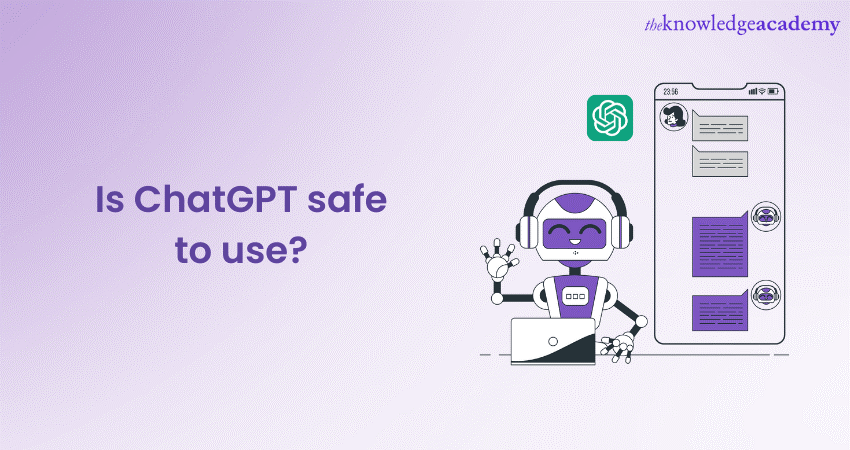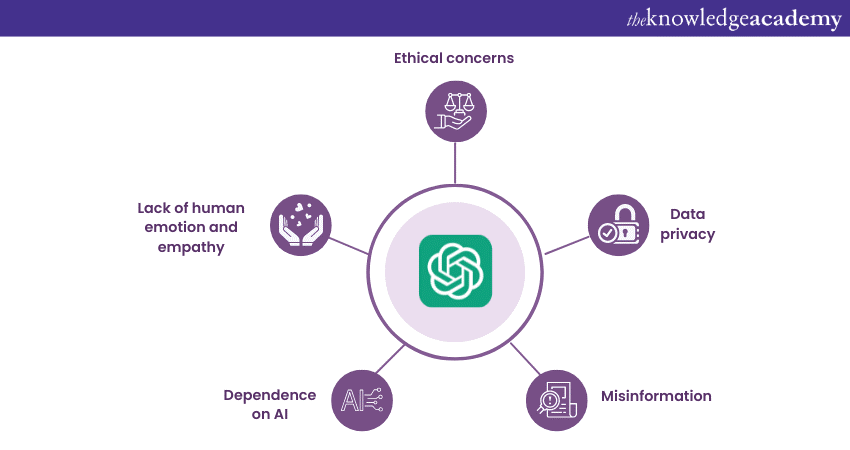We may not have the course you’re looking for. If you enquire or give us a call on 01344 203999 and speak to our training experts, we may still be able to help with your training requirements.
Training Outcomes Within Your Budget!
We ensure quality, budget-alignment, and timely delivery by our expert instructors.

ChatGPT, developed by OpenAI, is a leading-edge language model designed to engage in detailed and meaningful conversations with humans. Built on the transformative GPT-4 architecture, it is trained on a diverse array of internet text, enabling it to generate highly sophisticated dialogue that mirrors human conversation. Since its launch, there has been a common question among many people, ‘Is ChatGPT Safe?’
While it has an incredible ability to assist in many applications that range from education and content creation to customer service, it has limitations. If you are curious about the question “Is ChatGPT Safe?”, this guide will provide information on its reliability, security measures, and any potential concerns.
Table of Contents
1) Advantages of ChatGPT
a) Versatility
b) Efficiency
c) Language learning
2) Concerns about using ChatGPT
a) Ethical concerns
b) Data privacy
c) Misinformation
3) Conclusion
Advantages of ChatGPT
In this section, we will explore the advantages of using ChatGPT and gain a better understanding of its benefits.
Versatility
The versatility of ChatGPT is one of its most compelling features, serving a broad range of use cases beyond traditional AI capacities. Being trained on an extensive array of internet text, it uniquely generates relevant, coherent, and human-like responses to a diverse set of prompts.
This means it can facilitate tasks across various domains—from drafting and proofreading content in education and journalism to providing instant customer support in business operations or even simulating characters for video games.
Efficiency
ChatGPT's ability to enhance efficiency is a key advantage, particularly in time-sensitive environments. It can instantly generate human-like text in response to various prompts, thereby accelerating numerous tasks that traditionally require significant time and human effort.
For instance, in the context of drafting emails or writing reports, ChatGPT can generate content ideas, correct grammar, and ensure coherent flow, thus shortening the time spent on these tasks.
Language learning
ChatGPT is a beneficial tool in language learning, offering a unique, interactive platform for learners to practice and enhance their language skills. The AI model can comprehend and produce text that mimics human language.
By interacting with the AI, learners can practice dialogues and scenarios that resemble real-life situations, all in a relaxed and low-pressure environment. It can also be used as a resource to understand nuanced language elements such as idioms, phrases, or context-based language usage.
Additionally, learners can benefit from its corrective function, where the AI can identify and correct grammatical errors, enhancing the learning process. Moreover, its multi-language capabilities make it a valuable tool for those learning languages beyond English.
Gain in-depth analysis on how to analyse data and solve real-world problems by signing up for our Artificial Intelligence Tools Training now!
Concerns about using ChatGPT
"Is ChatGPT safe to use?" is one of the most important questions people have been asking about the popular AI ChatGPT. Let's examine some of the valid concerns that have been raised.

Ethical concerns
Ethical concerns play a significant role in using advanced AI models like ChatGPT. While beneficial, its capacity to generate human-like text can also lead to potentially harmful outcomes. For instance, it can be exploited to generate malicious content or spread misinformation, given its lack of ability to discern truth from falsehood.
It can also inadvertently produce content that is offensive, harmful, or discriminatory, particularly if it's given harmful prompts, thereby posing risks of harm to individuals or groups. Addressing these ethical concerns requires continuous efforts to improve AI systems, including building safeguards and promoting responsible use.
Data privacy
Data privacy is a critical concern in using AI systems like ChatGPT. While OpenAI ensures that ChatGPT doesn't store personal data after the conversation ends, applying such AI in various contexts brings forth privacy issues.
For instance, sensitive personal information might be part of the interactions when used in fields such as Healthcare or Finance. While OpenAI has robust policies, data breaches or misuse are potential risks that could result in privacy violations.
Concerns may arise about how third-party applications using ChatGPT handle user data. Therefore, users and developers alike must understand and address these privacy considerations.
Learn adversarial prompt engineering techniques for creating robust prompts by signing up for our ChatGPT Prompt Engineering Certification Course now!
Misinformation
Misinformation is a significant concern with AI models like ChatGPT. Despite its advanced capabilities, ChatGPT generates responses based on patterns it learned during its training rather than relying on factual knowledge.
This can lead to the propagation of incorrect or misleading information. For example, if the data it was trained on includes misinformation or biased information, the AI can unknowingly reproduce such content in its responses.
This is particularly concerning in the context of spreading misinformation about critical topics such as Health, Politics, or Science. Furthermore, ChatGPT’s realistic, human-like responses could give users a false impression of its responses being factually accurate.
Dependence on AI
Dependence on AI, particularly in the case of sophisticated models like ChatGPT, is a notable concern. While these tools offer substantial benefits in terms of efficiency and productivity, over-reliance on them can lead to several issues.
For instance, critical thinking, creativity, and problem-solving skills could be undermined if tasks traditionally demanding these skills are delegated to AI. In educational settings, if students rely heavily on AI for homework or research, it could hamper their learning process and ability to develop independent thought.
Moreover, excessive dependence on AI could lead to complacency and a reduction in the development of new skills, given the ease with which tasks can be automated. Balancing AI use with human skill development is, therefore, essential.
Lack of human emotion and empathy
Despite its ability to simulate human-like conversation, ChatGPT, like all AI, lacks the ability to feel or understand human emotion and empathy. It operates purely on learned patterns from data and does not have personal experiences or emotions.
This limitation is significant in contexts where empathetic and emotional understanding is critical, such as mental health counselling or sensitive customer service situations. AI might not be able to provide the emotional support or understanding that a human could offer in these situations.
Furthermore, while AI can mimic certain language patterns associated with empathy, the lack of genuine emotion can sometimes lead to responses that are inappropriate or out of context, creating potential misunderstanding or distress.
Conclusion
After considering the question "Is ChatGPT safe?" we can conclude that while ChatGPT offers immense potential with its versatility, efficiency, and application in language learning, as some of its notable advantages, it's essential to navigate its use with awareness of the associated concerns. "Is ChatGPT safe to use?" will remain a daunting concern among many, but balancing the benefits with these challenges to use such AI tools responsibly is crucial.
Understand how to generate human-like responses, handle user inputs, and address biases; sign up for our Introduction To ChatGPT Training now!
Frequently Asked Questions
Upcoming Data, Analytics & AI Resources Batches & Dates
Date
 ChatGPT Course
ChatGPT Course
Fri 27th Dec 2024
Fri 14th Feb 2025
Fri 11th Apr 2025
Fri 13th Jun 2025
Fri 15th Aug 2025
Fri 10th Oct 2025
Fri 12th Dec 2025







 Top Rated Course
Top Rated Course



 If you wish to make any changes to your course, please
If you wish to make any changes to your course, please


